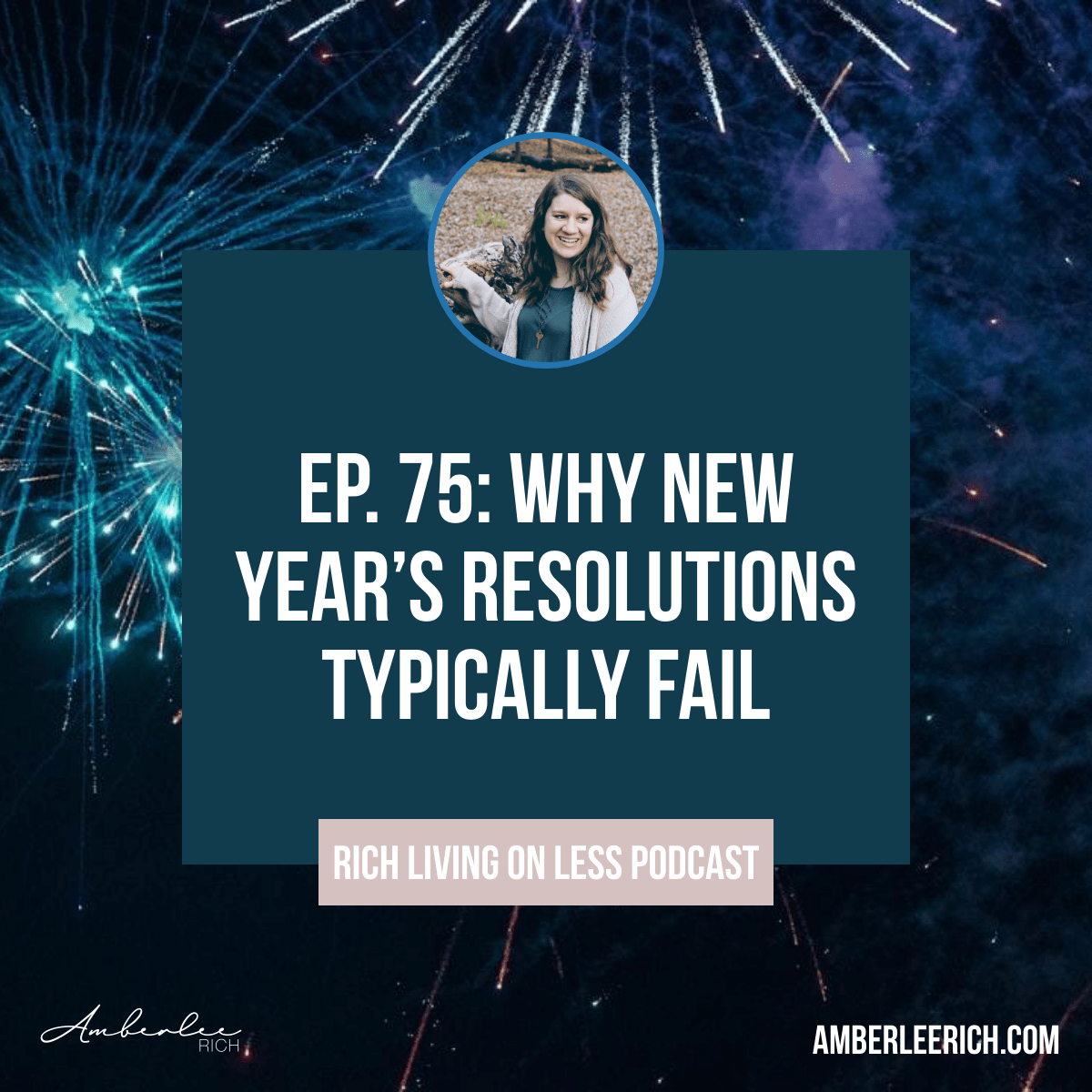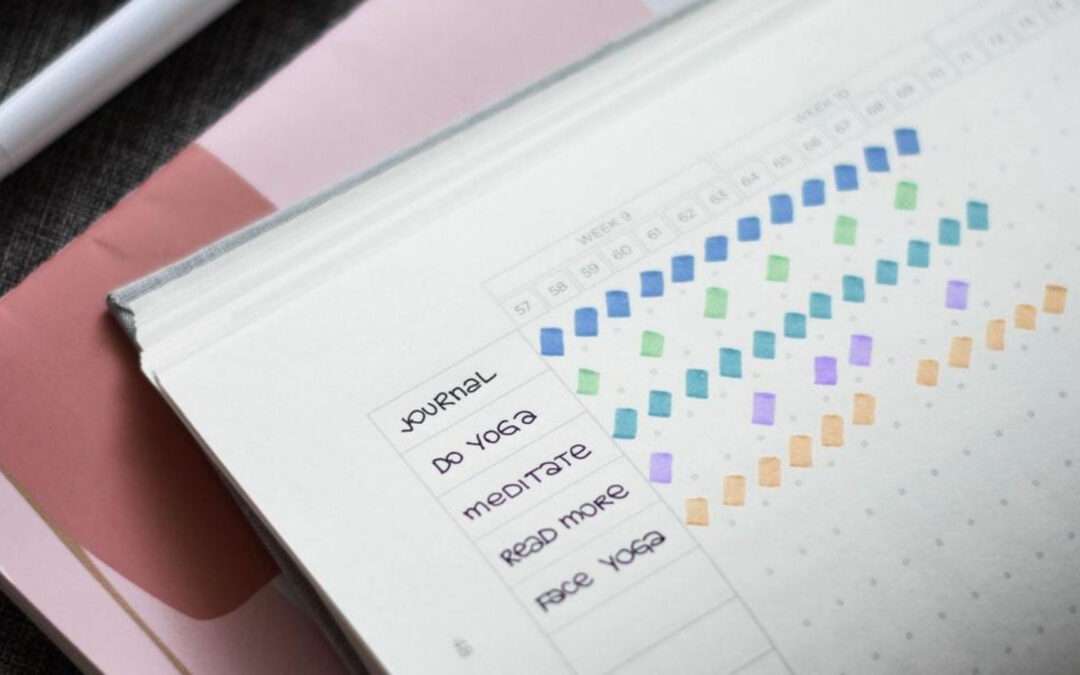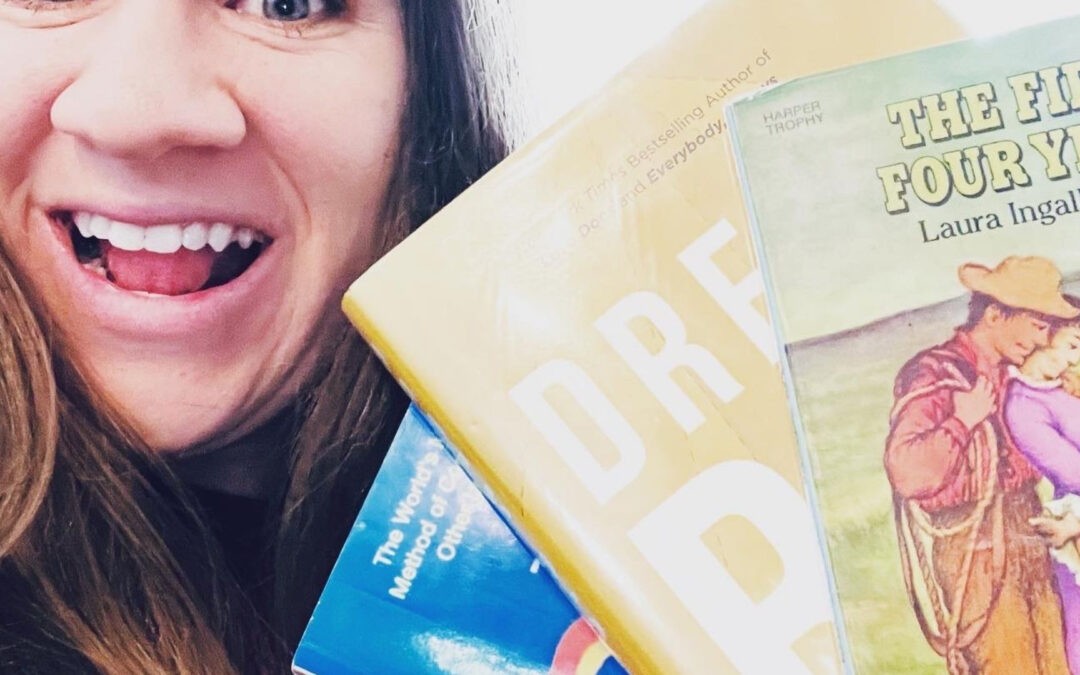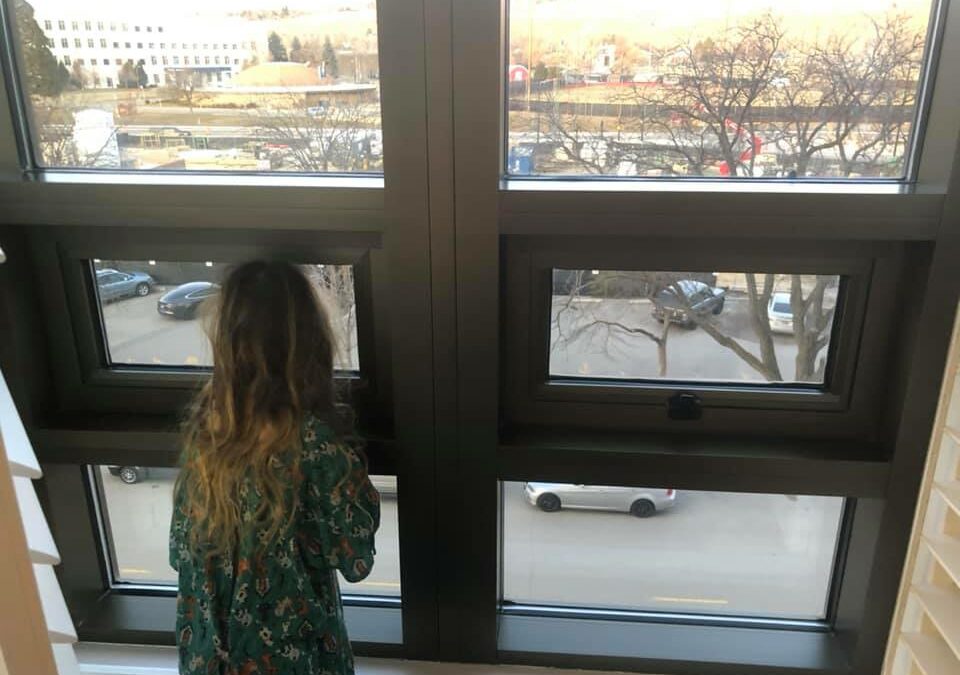Hey friend, welcome to today's show. This whole year, we have been going through a lot of information, helping us create change in our lives without using a typical New Year's resolution. In my podcast, episode 75, we talked about why resolutions typically fail. And a...

Ep. 75: Why New Year’s Resolutions Typically Fail

Hey friends. Thank you so much for tuning into today’s show. We are so close to 2022. I know for the majority of the human population, we just view this new year, every new year as just a fresh start. And I think that’s such an amazing thing. I think we sometimes put off all these things we want to work on until the New Year.
We’re just trying to, you know, like Just enjoy our lives and then like, oh, we’re just going to start working out. We’re going to start eating healthier. We’re going to start doing X, Y, and Z when it hits the New Year, like there’s just this magical button by changing the calendar over to the next year that, that something’s going to just change. Think about the New Year’s resolutions you have set in the past.
Maybe the ones that you want to have this upcoming year. Like we all have these ideas of what we want to become. During the new year season, we start really thinking about like who we want to be and what our identity is. And I think that’s something that’s really powerful and a wonderful time to really start reflecting on who we are and what we want to become, because most of us are not fully satisfied with where we’re at in life. We want to be better in different ways, but we don’t know how to actually get there. A lot of times we just focus so much on who we want to become, and we don’t actually take the time to think about the wins that we had this past year.
And so I want you to just not try to fast forward into 2022, but also rewind and look back at the wins and the failures you had this past year in 2021. And I think this is a really important practice to do every year, because it’s really easy to just always feel like, oh, I’m just not good enough.
I needed to do this, this and this. And you don’t realize how far you’ve come. When you look back, you can just see things that you might not have noticed. When it comes to even prayer we ask God for all these different things. And then when he gives it to us, we just keep moving on and we don’t remember the promises and how he fulfilled the prayers that we asked.
And I think that’s how we, how we live our lives is that we have such a short term memory. We’re just trying to move forward and we forget about the good things that we’ve had.
So, I want you to imagine what you want this upcoming year to look like. And I want you to think of this in all the realms of your life, not just with your finances.
With your finances maybe you want to start saving more, investing, paying off debt. Maybe you want to start eating less refined sugar. Maybe you want to be a person who tells people positive things when you think about it in your head, instead of just keeping it to yourself, you want to actually say it out loud. Maybe you want to make sure you don’t overdraft this year.
Maybe you want to be a person who runs a couple times a week. Someone who budgets and has a plan for their money. Maybe you want to be a person who plays board games with their kids every Sunday night. Maybe you want to be a person who watches less TV, who reads a book every month, who goes and hangs out with their friends.
There’s so many different things you can think of, but I want you to just imagine what you want this upcoming year to look like.
I know I’ve looked back at my own new year’s resolutions and the things that I write down, there’s a lot of times that I just go through and I just type out every single thing I want to change in my life.
And I look at that and it’s just absolutely overwhelming.
You hear so many people that they don’t even reach their new year’s resolutions. Like maybe they do it for a week or two and they just give up. But why, why do resolutions typically not work?
If we want to be a person that changes and progresses and turns out to be a better version of ourselves, if we follow the regular new year’s resolutions, how can we actually avoid the pitfalls?
So that’s what we’re going to be talking about.
One of the things that really makes it challenging with doing a New Year’s resolution is that a lot of times they aren’t sustainable. We’re just saying like a blanket thing. Like I want to be healthy or I want to lose 30 pounds this year. We can say those things, but like, how do you actually put that into practice?
There are a lot of little things that we need to do to change our identity and change who we are to be able to meet those goals and not just give up because we have our own habits and the ways that we live our life and normally new year’s resolutions are doing something counter to what we’ve done in the past. And so it’s hard to make big changes.
Then one other reason why resolutions rarely work is that we have this mentality. It’s like go big or go home. We have all these things we want to change. And when we don’t make them or becomes too challenging we just give up. It’s really easy that it’s like, if we fail or we screw up and we eat a piece of cheesecake when we’re not supposed to that, we just want to say like, okay, well I’m done.
I, I’m not good at this. And just live your life as normal. And you don’t reach that resolution, that goal that you had for yourself.
And another reason why resolutions rarely work is that they don’t change our identity. We are trying to become someone we’re not, but we don’t actually believe what we’re trying to do.
And let me just give you an example. So, my husband and I have been reading Atomic Habits. It’s a really good book for helping you figure out how to make small changes in your life that actually are sustainable. And to change the way that you go about setting goals and actually reaching them.
It’s a great read so I would highly recommend reading it if you haven’t done so already as Atomic Habits by James Clear.
I want to give you, a little snippet from his book, Atomic Habits, and I love the name atomic habits, because you think of an Adam, it’s something that’s really tight. And what we’re doing is we’re just changing our habits in a very small level.
And so when you do it at this micro level, it helps you to completely transform who you are instead of just being totally overwhelmed and just giving up.
So here it is:
“Every action you take is a vote for the type of person you wish to become. No single instance will transform your beliefs, but as the votes build up, so does the evidence of your new identity.”
I really love this quote because I can think of things that I believe about myself. And I’m guessing you do too, that you just feel like this is who I am. And then when you try to do something different from that, you have to just have some wins that you see like, oh, I actually am able to do this.
For me, I really struggle with being a person who works out consistently. And I wouldn’t say that I’m great at it. And one thing that I’ve always felt like, oh, I’m just not athletic. I have these mindsets inside me that like, well, I’m not athletic, so I can’t do sports. And then I’m becoming like this negative Nancy that is becoming this self- fulfilling prophecy, because I feel like, well, I’m not athletic. I just, I can’t do this.
What I’ve started to do is at night time after the kids go to bed, I do some pushups and I do some stretches and I use like resistant bands. It’s nothing like super crazy, but I just do a little bit every day and I’m been trying to add like one more pushup a week, something that’s like, oh, I can go and do this faster than I used to. Like, I I’m feeling like I’m getting stronger, not by a ton, but by a little, and I’m making these small changes. And so I’m now starting to work on transforming my viewpoints of, well, I actually do work out sometimes and I’m trying to do this every day. So I’m doing at least something, even if it’s a short bit of time to make me stronger each day.
Taking those little actions helps me change my identity. It gives me evidence that maybe I’m not this completely unathletic person and I can work on changing. It’s not like I have this fixed person that I am just unathletic, I’ll never be able to throw a ball in my life kind of thing.
And I’m sure you can probably come up with some ideas for yourself of like, are there things that about yourself that you feel like this is who I am and you want to change it, but you need to have some little wins that shows you that you actually can be this person you want to be.
Another reason why resolutions rarely work is that we, we don’t know how to put the resolutions into practice. Like a lot of times we’ll say like, well, I want to lose 30 pounds or whatever it is, but then there’s a lot of different ways you can go about doing that and actually going through the details, like how do I make this work on a, on a weekly basis, daily basis?
How does that affect my grocery shopping? What I have in my pantry, my fridge, my freezer, working out all of those things, like it, it has a lot of little pieces. And I think a lot of times we don’t just go into the details of like, how do I actually put this into practice?
How do you eat an elephant is like this giant thing you feel like you don’t even know how to do it. But it’s one bite at a time. Like you need to figure out how you can make this into a bite sized piece to actually be able to change who you are.
Another reason why resolutions rarely work is that we run out of motivation.
We feel like we need to have this crazy amount of self control to be able to do it. Like for me, I went, I remember I was like, I think three months without having sweets. And I love sweets and it was such a challenge for me. I was surprised that at the end of it, I didn’t even feel like I wanted sweets anymore.
You get changed when your motivation is strong. But a lot of times we just run out of motivation. We’re trying to do this maybe for the wrong reasons. Maybe we are doing this by ourselves and we don’t have any support. There’s a lot of reasons why we just become unmotivated.
It’s just not fun anymore.
And another reason is that we get bored. If we’re trying to do something. It’s just like, Ugh, this isn’t fun anymore. This isn’t enjoyable. It’s boring. We just want to give up.
James Clear who wrote the Atomic Habits. He talks about this and he says,
“the greatest threat to success is not failure, but boredom. We get bored with habits because they stopped delighting us. The outcomes become expected. And as our habits become ordinary, we start derailing our progress to seek novelty.”
We think about that. Like, we want something new. We want something that seems exciting and it’s really easy to just get bored with things.
They’ve done tests of how we have the attention span of less than a goldfish now. Our attention spans are so puny from what they were decades in the past. And I think a lot of it is like, we just are being bombarded by so many things all the time and we’re in this go, go, go, go, go mentality.
And it’s hard to not get bored with what we’re doing, especially if it’s not something that’s easy.
So in the next several episodes, we’re going to go in- depth on how to make lifestyle changes that will actually stick.
We’ve been going through this mini series, helping you set up your finances, and this is part of it.
If you want to actually create habits that will sustain you so that way you can actually get out of debt, you can work on saving and having an emergency fund and investing.
All of these things take some time and intentionality. And we need to have these set up. So that way we can actually have financial freedom.
We are doing the Debt Dump Challenge. It’s coming up really soon, January 10th through the 14th. It’s a free challenge. It’s five days and it’s really actionable content. So there’s one a day for five days in a row. And I’m just going to be giving you some really important information that will help you go through and actually do something about it and set yourself up so you can get out of debt.
That’s helping you change your identity. Help you create a resolution that you actually will be able to do, setting you up for success.
if you would love to be part of this challenge, I really hope you are. Please go to debtdumpchallenge.com and you can sign up. Tell your friends, your relatives, anyone, you know, that really wants to get out of debt.
This is amazing challenge to really set you up for success. And if you have more people joining you like that is companionship, and it helps you to actually go and show up and do this. Okay. And so it’s five days, so it’s not going to be something that’s just totally overwhelming. It’s absolutely doable.
Going back to what we talked about today, I want to leave you with some actual ideas and some tips to help you set yourself up for this upcoming year. Instead of setting some new year’s resolutions that you write down. And then two weeks later, you abandon and forget. And then you think about it at the end of December of 2022. And you’re like, oh, I never reached that. Instead of having all these lofty goals and not ever attaining them. How can we actually make them? This week, I want you to reflect on this past year. Because if you don’t pay attention to what has happened in the past, you’re not going to set yourself up for success in your future.
Reflect on the highs and lows. This year has been a pretty crazy year. I know for us, it has been a lot of ups and downs. For so many people with COVID and everything, it has been a very challenging year in itself. Really two years that it’s been just a lot.
And I think it’s easy to try to forget about it, but I want you to pay attention.
Instead of just rushing into your resolutions, let’s, let’s figure out like, what were you successful with this past year? Because when you see how you are successful, that will help you to see how you are actually able to reach the goals that you want to reach.
Also look at where have you been, so you know, where you want to go in the future.
What happened this year. What stood out to you?
For me, there were a lot of big things that happened. My daughter had MIS-C. We were in the hospital.
For five days during Christmas last year. Being able to be home this Christmas was just a breath of fresh air and I am so grateful for it compared to what I’ve had in the past. And I think when, when you go through trials, you are able to experience different things than you ever have before.
And there’s good things that come out of it. When I look at what we went through and we had to be quarantined for eight weeks and weren’t able to leave our home and, and how we were able to have, just a lot of really strong relationships and friendships grow this past year, how we’ve had changes in job situations and changes in all kinds of different things.
Like I’m homeschooling my kids that started in January of last year. Our life has changed a lot in a short amount of time and looking back at what were the wins, what were the things that we really struggled with? How can we learn from the mistakes we made this past year? So we don’t make them again.
Think about your wins, your losses. And then I want you to also think about what are some things you want to continue that you started this year.
For us, one of the things that we started this year was really working on practicing a Sabbath. That’s really just focusing on having a 24 hour set of time each week, where we just really slow down and we’re trying to connect with God with our family.
We unplug from movies, from TV, from our phones, and really just work on connection. And that has been a huge, amazing thing that we started this year that we’re going to continue. And so looking back at the things that really went well.
How are you going to, to make that work for this upcoming year?
And then also, I want you to think about what didn’t work well this past year that you don’t want to carry on to this, this upcoming year. Maybe you are so busy and overwhelmed that it’s too much. What can you do and say no to so that way that doesn’t happen, this upcoming year.
Reflect on this past year and it takes some time to do this, and I would recommend doing this through a conversation with your spouse if you’re married.
If you’re not married, talk to a friend or a sibling or a parent or someone who you’re close with that, you can really just have a conversation. You don’t have to write all of this down, but I think a lot of people, it helps to just verbally process it. And when you talk about these highs and the lows of this past year, you’re going to be able to have a grateful heart. It will bring up a lot of things that you might not like and some things that you really are like, man, this was amazing. Those things can really help.
You could even go through and look at your photos from this past year.
I normally make a calendar every year using our photos, like a personalized one, and going through and looking at the pictures of the past year is just such a, a reminder of all the good things that happened. And it helps me to remember, oh these little small insignificant moments, at least I, I thought that they were insignificant and looking back, I’m like, oh, this is such a good memory.
And it helps you to just revisit those things. So maybe you want to do something like that, that you, you really just go through and start looking at those photos and using that as a way to remember the good things that you had this past year.
Overall, I just want you to really pay attention to what happened this past year and what you want to continue for 2022 and what you want to just say no to. Use that as your measure to figure out what you want your next year to look like.
The next several episodes are going to really help you put those into practice. So thank you so much for tuning in, and I will see you next week.
More From This Category

Ep. 78: Habit Stacking

Ep. 80: 7 Ways to Create Time to Read
This year, one of the habits I'm trying to improve upon and track is my reading. I started outlining this episode and then I woke up in the middle of the night with some clarity and I've figured out what I needed to talk about. So it's almost 4:00 AM and here are my...









